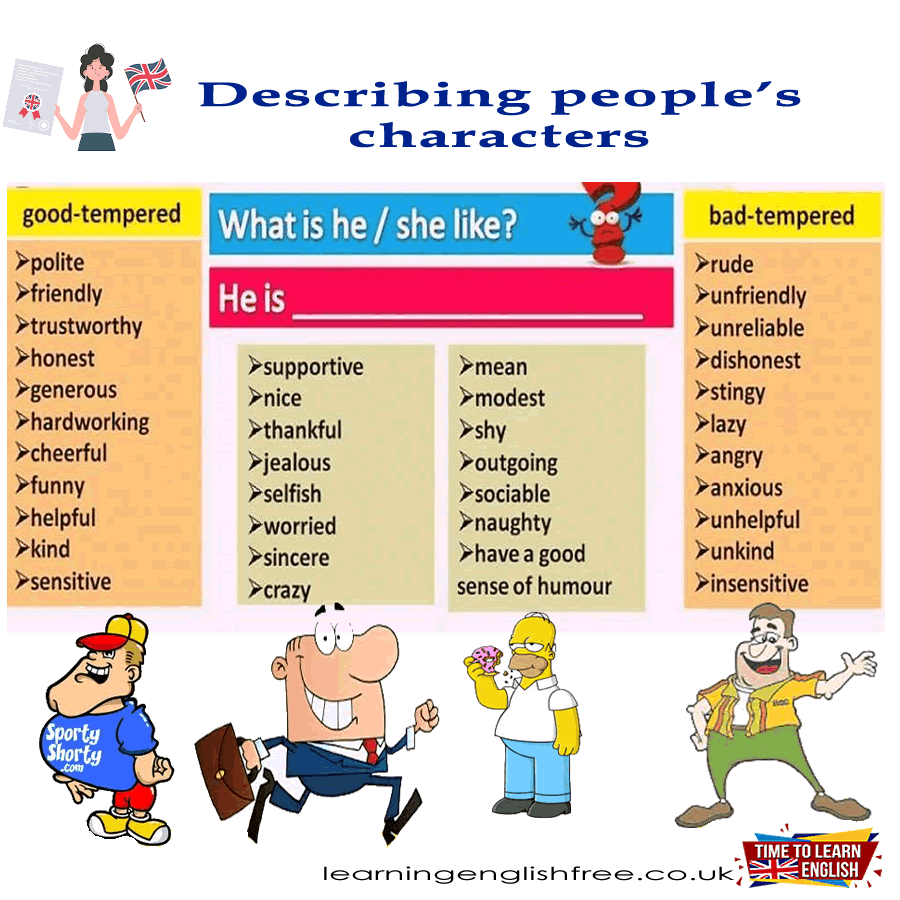
Understanding Personality Through English Vocabulary
Welcome to "Character Traits: Unraveling the Tapestry of Personality." This lesson is crafted to help you understand and express various aspects of people's characters in English. Describing someone's personality can be as complex as the personality itself. By the end of this lesson, you will have a rich vocabulary to describe different character traits, both positive and negative, which will greatly enhance your ability to talk about people in English.
Learning Objectives:
- Learn a wide range of vocabulary related to character traits.
- Understand how to use these words in the context of describing someone’s personality.
- Develop the skill to articulate observations and opinions about people's characters.
-
Good-Tempered: Pleasant and easy-going. Example: "Her good-tempered nature makes her popular at work."
-
Polite: Showing good manners and respect. Example: "He is always polite to everyone he meets."
-
Friendly: Kind and pleasant. Example: "She has a friendly smile for everyone."
-
Trustworthy: Deserving trust; reliable. Example: "He's very trustworthy; I can rely on him."
-
Honest: Truthful and sincere. Example: "She is known for her honest opinions."
-
Supportive: Providing support and encouragement. Example: "My friends are very supportive during tough times."
-
Generous: Willing to give more than is expected. Example: "He's generous with both his time and money."
-
Nice: Pleasant and agreeable. Example: "She's a very nice person to work with."
-
Hardworking: Putting a lot of effort into a task. Example: "He's hardworking and always completes projects on time."
-
Thankful: Expressing gratitude. Example: "She's always thankful for small favors."
-
Cheerful: Happy and positive. Example: "His cheerful attitude is contagious."
-
Jealous: Feeling envy towards someone else's achievements. Example: "She felt jealous of her sister's success."
-
Funny: Causing laughter; humorous. Example: "He's very funny and always tells great jokes."
-
Selfish: Thinking only of oneself. Example: "He can be quite selfish at times."
-
Helpful: Ready to help. Example: "She's always helpful when someone needs assistance."
-
Worried: Anxious or concerned. Example: "He's constantly worried about his exams."
-
Kind: Having a friendly and considerate nature. Example: "Her kind words made my day."
-
Sincere: Genuine; without pretence. Example: "His apology was sincere and heartfelt."
-
Sensitive: Quick to detect or respond to slight changes, signals, or influences. Example: "She's very sensitive to other people's feelings."
-
Crazy: Wild or enthusiastic. Example: "He's crazy about football."
-
Bad-Tempered: Easily annoyed or angered. Example: "He's quite bad-tempered in the mornings."
-
Rude: Impolite or having bad manners. Example: "It's rude to speak like that."
-
Unfriendly: Not friendly. Example: "Her unfriendly attitude turned us off."
-
Unreliable: Not able to be relied upon. Example: "He's talented but unreliable."
-
Mean: Unkind, spiteful, or unfair. Example: "She was mean to her classmates."
-
Dishonest: Deceptive or untruthful. Example: "Dishonest behaviour is not tolerated here."
-
Modest: Not boastful or arrogant. Example: "Despite her success, she remains modest."
-
Stingy: Unwilling to give or spend; not generous. Example: "He's too stingy to donate anything."
-
Shy: Nervous or timid in the company of other people. Example: "She's shy around strangers."
-
Lazy: Unwilling to work or use energy. Example: "He's too lazy to do his own laundry."
-
Outgoing: Friendly and socially confident. Example: "She's outgoing and makes friends easily."
-
Angry: Having a strong feeling of annoyance, displeasure, or hostility. Example: "He gets angry over trivial matters."
-
Sociable: Willing to talk and engage in activities with other people; friendly. Example: "She's very sociable and loves parties."
-
Anxious: Experiencing worry, unease, or nervousness. Example: "She's anxious about her job interview."
-
Naughty: Disobedient; mischievous (especially of a child). Example: "The naughty boy was causing trouble."
-
Unhelpful: Not providing assistance or support. Example: "Their unhelpful attitude was frustrating."
-
Unkind: Not kind; cruel or harsh. Example: "It's unkind to ignore someone's feelings."
-
Have a Good Sense of Humour: The ability to understand and enjoy jokes. Example: "He has a good sense of humour and always makes us laugh."
-
Insensitive: Showing or feeling no concern for others' feelings. Example: "Insensitive comments can hurt people's feelings."
Embracing the Language of Character
Reflecting on the Lesson
"Character Traits: Unraveling the Tapestry of Personality" provided a comprehensive exploration of vocabulary related to personality traits. We delved into words that describe various aspects of a person's character, equipping you with the tools to speak about people’s personalities effectively in English.
Key Takeaways
- A rich vocabulary allows for precise and varied descriptions of people’s characters.
- Understanding these traits can improve both your English comprehension and your ability to describe others.
- These words are useful for conversations, writing character profiles, and personal reflections.
Tips for Remembering and Using These Words
- Associate each trait with a person you know or a famous character as a mnemonic device.
- Practice using these words in daily conversations or in writing, such as in diary entries or character sketches.
- Create flashcards for each trait with its meaning and an example sentence.
Applying Vocabulary in Real-Life Situations
These character traits are useful for describing friends, colleagues, characters in a book, or even oneself. They enrich your language and enable you to express your perceptions and feelings about others more clearly.
Join Our Learning Community
For more enriching English lessons, visit our Facebook page at www.facebook.com/learningenglishfree.co.uk. Share your experiences, connect with fellow learners, and access additional resources to enhance your English language journey.
